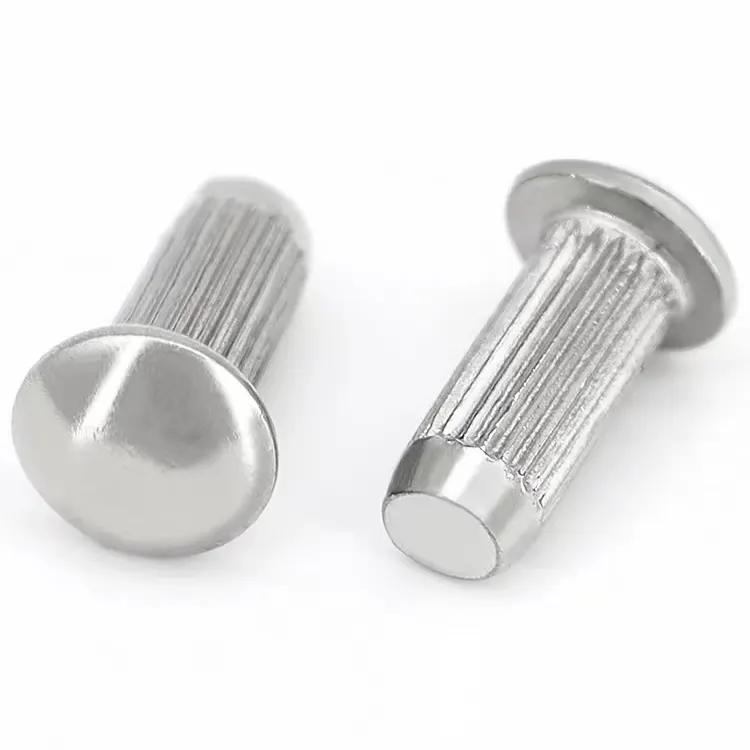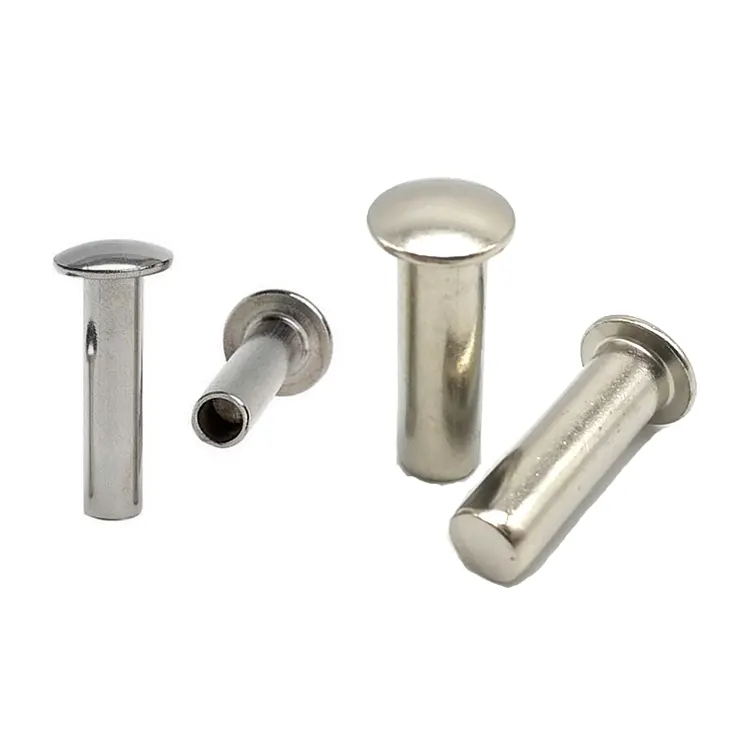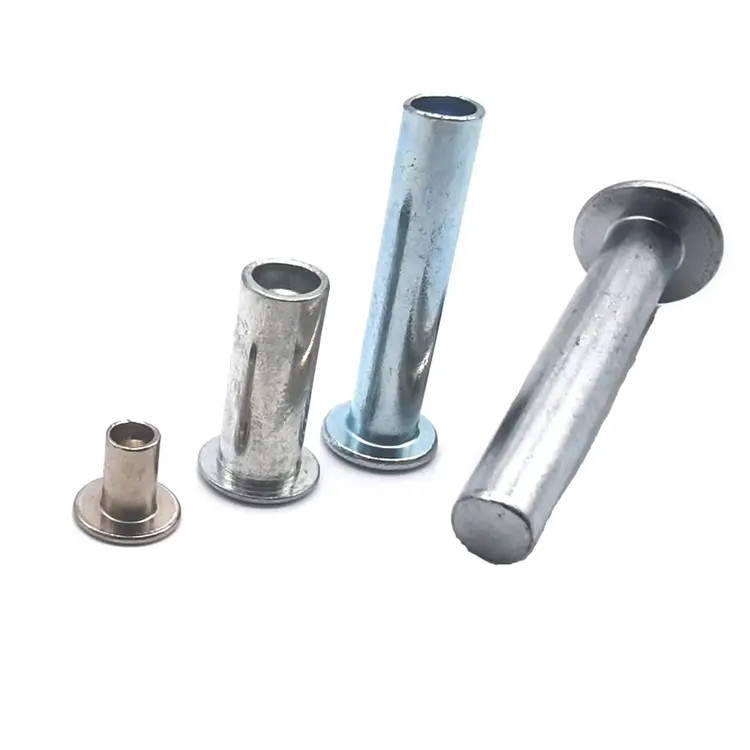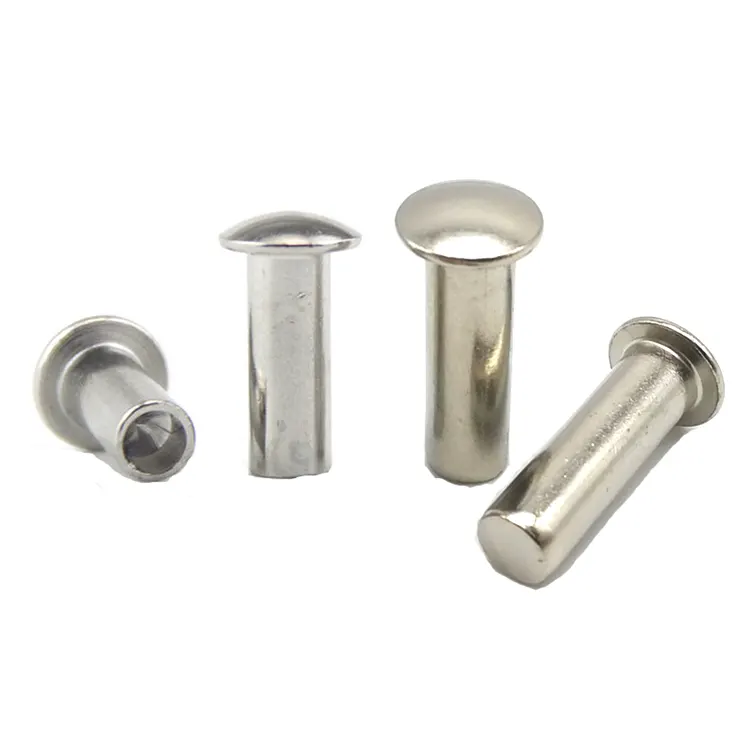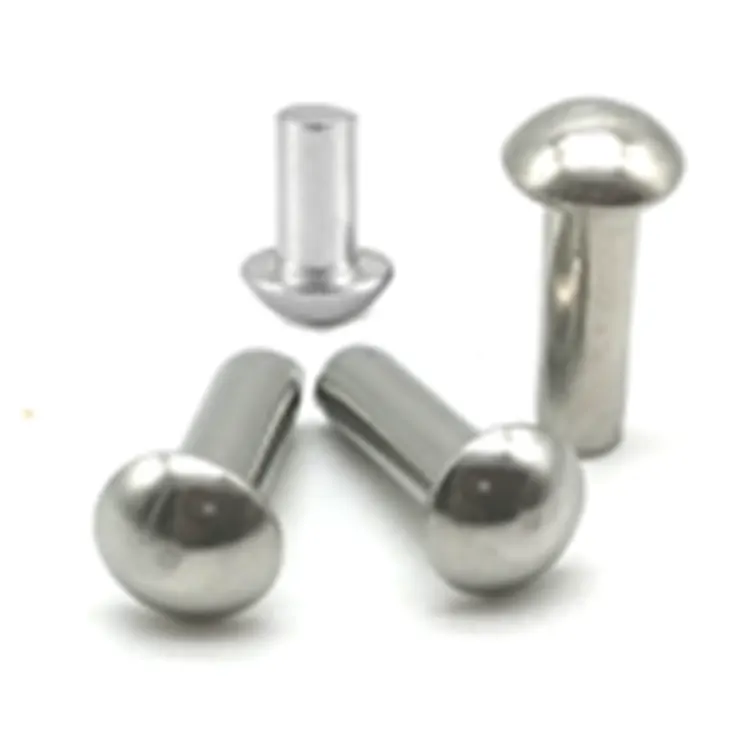Klinknagels
As one of professional manufacturer in China, Notin would like to provide you Rivets. And we will offer you the best after-sale service and timely delivery.
What is a rivet?
A rivet is a permanent mechanical fastener used to join two or more materials. Rivets work by inserting a metal pin into an aligned hole and deforming the end, creating a strong, secure, and durable connection. Unlike temporary fasteners like screws, rivets do not rely on threads, but instead form a permanent connection, making them ideal for applications requiring high strength, durability, and vibration resistance.
Classification of Rivets
Rivets are typically categorized by head shape, degree of hollowness, or material.
Based on head shape, rivets can be classified as flat head rivets, round head rivets, countersunk head rivets, mushroom head rivets, universal head rivets, truss head rivets, etc.

Based on degree of hollowness, rivets can be classified as solid rivets, semi-tubular rivets, or full tubular rivets.
Based on material, rivets can be classified as brass rivets, stainless steel rivets, steel rivets, aluminum rivets, copper rivets, etc.

What surface finishes are available for rivets?
Rivet surfaces are typically treated with rust-proofing treatments, primarily electroplating, including zinc plating, nickel plating, chrome plating, tin plating, gold plating, and silver plating. Electroplating is a common rust-proofing method for rivets. It applies a layer of plating to the rivet surface through physical or chemical methods. The plating effectively prevents corrosion and rust, while also providing a certain aesthetic effect.
Another special surface treatment method is head coating. Head coating is performed after the rivet is electroplated. This allows for a variety of colors on the rivet head, achieving an aesthetically pleasing finish.
Aluminum rivets cannot be electroplated, but they can be anodized. Anodizing also allows for a variety of color options, but the unit price is higher than electroplating.
Rust-proofing the rivet surface is crucial, effectively extending the rivet's service life and ensuring a secure connection. Different rust-proofing methods are suitable for different environments and applications, so the choice should be tailored to the specific situation.
- View as
Mannelijke vrouwelijke klinknagels
Nuote Metals is een gespecialiseerde fabrikant van mannelijke vrouwelijke klinknagels in China. De voordelen van mannelijke vrouwelijke klinknagels zijn eenvoudige installatie en lage kosten. Vergeleken met andere verbindingsmethoden, zoals lassen of lijmen, vereisen mannelijke vrouwelijke klinknagels geen gespecialiseerde vaardigheden of lange uithardingstijden. De nadelen zijn echter ook aanzienlijk: de verbindingssterkte is beperkt, waardoor deze niet geschikt is voor omgevingen met hoge intensiteit of hoge trillingen. Na langdurig gebruik kunnen ze losraken, waardoor regelmatige inspectie nodig is.
Lees verderStuur onderzoekGekartelde klinknagels
Gekartelde klinknagels bestaan doorgaans uit een kop, schacht en staart. De schacht heeft een diagonaal of recht gekarteld patroon, een machinaal bewerkte reliëfstructuur die zorgt voor een betere grip tijdens de installatie en voorkomt dat het gereedschap wegglijdt. De schacht is cilindrisch, waarbij de lengte en diameter variëren afhankelijk van de toepassing. Gangbare maten variëren van 3 mm tot 8 mm in diameter en 5 mm tot 20 mm lang. De staart kan ook schroefdraad of groeven hebben om te passen met moeren of andere bevestigingsmiddelen.
Lees verderStuur onderzoekIjzeren ronde kop klinknagels
IJzeren klinknagels met ronde kop zijn een bevestigingsmiddel dat veel wordt gebruikt in de industriële productie en het dagelijks leven. Hun unieke ontwerp en uitstekende prestaties maken ze tot een topkeuze op veel gebieden. Nuote Metals is gespecialiseerd in de productie van ijzeren klinknagels met ronde kop. De afmetingen van onze klinknagels voldoen strikt aan de toleranties vermeld op de tekeningen van de klant. Elk proces is onderworpen aan een kwaliteitscontrolecyclus om de kwaliteit van het eindproduct te garanderen. We beschikken over tientallen machines voor koudpersen, met een dagelijkse productie van tientallen miljoenen klinknagels.
Lees verderStuur onderzoekIjzeren klinknagels
IJzeren klinknagels, ook wel bekend alskoolstofstalen klinknagelszijn een type bevestigingsmiddel dat doorgaans is gemaakt van koolstofstaal met oppervlaktebehandelingen zoals galvaniseren. Ze bieden een treksterkte van 400-500 MPa en zijn geschikt voor toepassingen zoals elektrische apparatuur. Om verschillende klinktoepassingen mogelijk te maken, worden ijzeren klinknagels doorgaans vervaardigd als halfholle of massieve klinknagels. IJzeren klinknagels zijn een fundamenteel maar cruciaal mechanisch onderdeel, dat veel wordt gebruikt vanwege hun sterkte, betaalbaarheid en gebruiksgemak.
Lees verderStuur onderzoekIJzeren pankopklinknagels
IJzeren platkopklinknagels, met hun lichtgewicht, corrosiebestendige en esthetisch aantrekkelijke eigenschappen, zijn veelzijdige allrounders in de industriële productie geworden. Of het nu gaat om gewichtskritische toepassingen of het dagelijks leven, ijzeren klinknagels met bolkop bieden uitzonderlijke prestaties en betrouwbaarheid. Welkom bij Nuote Metals in Dongguan, China, specialist in deze klinknagels. Wij bieden hoogwaardige producten met gegarandeerde levering. Wij vervaardigen ook andere hardwareaccessoires, zoals oogjes, machinaal bewerkte onderdelen en gestempelde onderdelen.
Lees verderStuur onderzoekIJzeren paddestoelkopklinknagels
Nuote Metals is een professionele klinknagelfabrikant gevestigd in Dongguan, China. Onze ijzeren paddestoelkopklinknagels hebben, zoals de naam al doet vermoeden, een paddestoelvormige kop met een halfholle of massieve kern. De kop is doorgaans groter en biedt een goed draagoppervlak. Deze structuur maakt vervorming tijdens de installatie mogelijk, hetzij door extrusie of door gespecialiseerd gereedschap, om twee of meer materialen veilig met elkaar te verbinden. Ze zijn gemaakt van ijzer en zijn meestal gegalvaniseerd of behandeld met andere afwerkingen voor corrosiebestendigheid.
Lees verderStuur onderzoekWhat are the advantages of rivets over other fasteners?
1. Ease of Installation
Rivets are fast to install, and even fully automated for high-volume applications, resulting in a simple and efficient operation process.
2. Connection Reliability
The riveting process is standardized, with strict quality control, resulting in highly stable connections. Visual inspection allows for quick verification of connection quality.
3. Vibration and Impact Resistance
Rivets connect through deformation or interference fit, providing strong clamping force and excellent vibration resistance, capable of withstanding vibration and shock.
4. Low Cost
Rivets are easy to install and can be fully automated, saving significant labor costs.
What are the advantages and disadvantages of rivets made of different materials?
Aluminum Rivets
Advantages: Lightweight, reduces overall product weight, low cost, suitable for general civilian applications.
Disadvantages: Low tensile and shear strength, unsuitable for high-strength workpieces, prone to electrochemical corrosion when in contact with metals such as stainless steel.
Stainless Steel Rivets
Advantages: Strong corrosion resistance, high hardness, suitable for high-strength workpieces (such as marine equipment)
Disadvantages: Higher cost, typically more expensive than aluminum rivets of the same specification.
Brass and Copper Rivets
Advantages: Excellent conductivity (such as connecting electronic components), good corrosion resistance.
Disadvantages: Higher cost, more difficult to process.
Steel Rivets
Advantages: High hardness, high connection reliability, and wide applicability.
Disadvantages: Compared to other materials, iron rivets are more prone to rusting.
What are the main applications of rivets?
Rivets have a wide range of uses, from small items like a pair of scissors to large items like airplanes and ships, as well as in high-precision medical applications.
Industrial Manufacturing
Rivets are used in a wide variety of industrial fields, wherever there is a need to connect two or more materials.
Electronics
Rivets secure heat sinks and chips, providing both vibration damping and noise reduction, and are widely used in the cooling systems of electronic products such as computers and mobile phones.
Automotive
Rivets are widely used to connect components of automobile bodies and chassis, such as doors and hoods. Their lightweight and corrosion-resistant properties make them an indispensable joining method in automotive manufacturing.
Aerospace
In aircraft manufacturing, rivets are used to connect different fuselage components, such as wings and tailplanes. Millions of rivets create high-strength, corrosion-resistant joints. Aluminum and titanium alloy rivets are often used to connect components of corresponding materials, ensuring stability in extreme environments.
Rivets are used everywhere. The above examples only represent a small number of their applications. We see rivets everywhere in our daily lives, such as on scissors, folding beds, and strollers etc. Rivets can be customized to different sizes and materials depending on the application.
Nuote Metals has specialized in the rivet industry for over a decade. Our factory is located in Dongguan, a city known as the "World Factory," a city with a developed industry and convenient transportation. This allows us to respond quickly when acquiring raw materials and supporting surface treatments, meeting our customers' needs for quick access to samples and bulk orders. We produce 10 million rivets daily and have molds of various specifications, allowing us to produce rivets as small as 0.8mm and as large as 10mm. We welcome your inquiries and visits.







